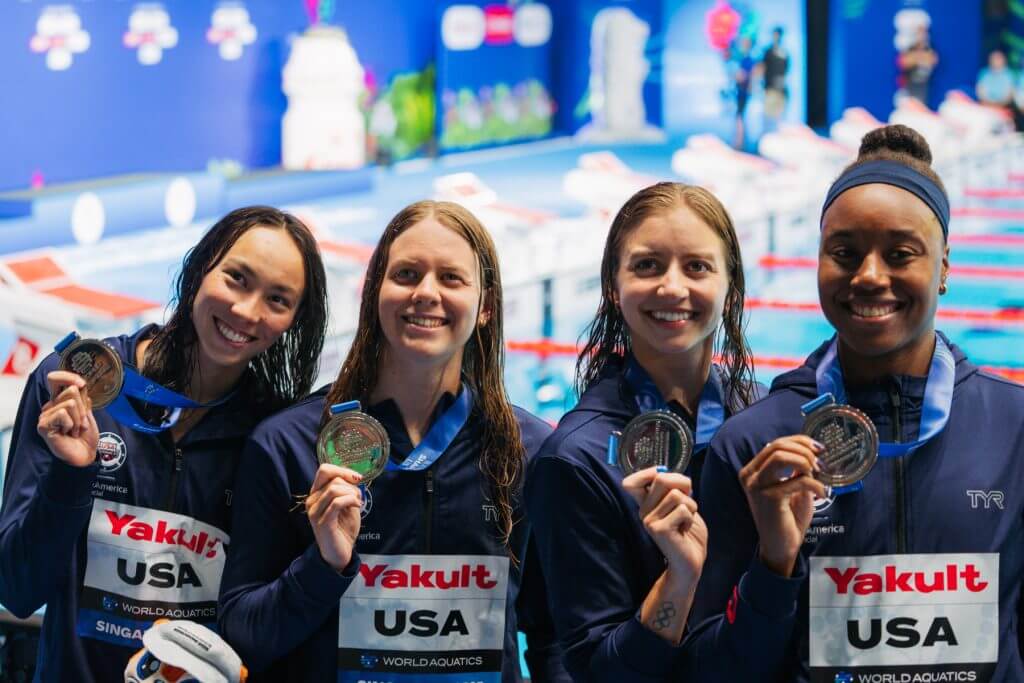Despite Singapore Silvers, American Women Have Promising Future in Freestyle Relays
The results in the women’s freestyle relays at this year’s World Championships showed a continuation of generational Australian dominance, even if both events came down to the closing legs in tight finishes against the United States. Olivia Wunsch overtook Torri Huske for gold in the 400 free relay, and four days later, Mollie O’Callaghan had too much speed for Katie Ledecky on the anchor leg in the 800 free relay.
The Aussie women crushed the world record in the 800 free relay at the 2022 Commonwealth Games and have not been touched since. In the 400 free relay, the streak goes back far longer, with four consecutive Olympic gold medals dating back to the 2012 Games in London and only two international losses in that span, both to the Americans and both with key figures absent.
But despite these setbacks in Singapore, the U.S. women begin the quadrennium leading into the 2028 Olympics in Los Angeles with their best positioning in the freestyle events in years. Widespread gastrointestinal illness severely hampered American results at the World Championships, but that did not erase the progress shown at U.S. Nationals and at other competitions since then.
At the 2024 Olympic Trials, Claire Weinstein finished second in the 200 free in 1:56.18. Less than a year later, as Weinstein elevated herself to individual medalist at a major competition, a mark of 1:55.82 was merely good enough for a fourth-place tie at Nationals. Huske and Anna Peplowski both went under 1:56 for the first time in that race while Erin Gemmell also swam a best time.
Fast forward to Worlds, and the team was still in contention until the end despite illness ruling out Huske from the event while Gemmell as severely compromised. Weinstein, Peplowski, Gemmell and Ledecky still combined for an American-record-setting performance.
As for the 100 freestyle, this year’s Nationals final marked the first time three American swimmers went under 53 seconds in the same heat. Huske and Gretchen Walsh claimed the individual slots for Worlds while Simone Manuel, the 2016 Olympic co-champion and American-record holder in the 100 free, had her fastest effort in six years. Not included in that mix was Kate Douglass, who had been in 52-second territory in winning the previous two national titles and split as fast as 51.90 at Worlds.
In the Worlds relay final, the Americans briefly pulled into the lead even after Walsh was pulled off the team last-minute because of her physical condition. Huske vaulted the group into the lead on the anchor leg, but sickness had zapped her of the strength required to close. The split was 52.88, admirable under the circumstances but a full second down on her career-best mark from last year’s Olympics.
Rylee Erisman — Photo Courtesy: Peter H. Bick
Add in Rylee Erisman to that equation following her resounding success at the World Junior Championships. The 16-year-old from Florida had already worked herself into the sprint conversation with a best time of 53.75, but she crushed that mark by almost a second on the way to gold last week in Otopeni. Erisman clocked 52.79, becoming the sixth-fastest American ever and fifth-fastest swimmer in the world this year. She followed that by anchoring the American women’s 400 medley relay in 52.75, an especially impressive performance considering she had already raced finals of the 50 and 200 free in the same session.
Her World Juniors effort qualified Erisman for the senior-level team bound for next year’s Pan Pacific Championships, and the Americans ow have five swimmers with a flat-start time under 53. There’s potential for more: Erisman is on a track of rapid improvement while Walsh is still figuring out the long course 100 free. Huske remains the fastest swimmer in the world this year.
Provided there is no further freak illness that derails the American team, this team will be favored to dethrone Australia at Pan Pacs. While the Aussies could have Ariarne Titmus returning to the 800 free relay team next year, no such reinforcements are coming for their squad in this event.
Meanwhile, the Americans should be reaching for sub-3:30 territory, never achieved by any team aside from Australia. The times that American swimmers have posted since the start of June: — 52.43 (Huske), 52.78 (Walsh), 52.79 (Erisman) and 52.83 (Manuel) — add up to 3:30.83, just two tenths off what Australia clocked in the Worlds final before subtracting time for relay starts. This group is still well short of the world record of 3:27.96 that the Aussies posted in 2023, but recent trends suggest further jumps within range.
Record run or not, Australian dominance in the women’s 400 free relay might be sunsetting, at least for now. For the first time in generations, the U.S. women are trending toward sprint dominance.
